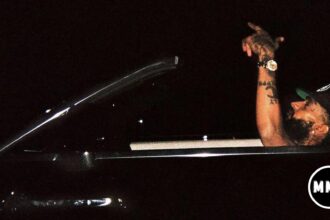Producer, songwriter, and friend of the site, Nate Mondschein, compares the NBA Conference Finals teams to historic album runs by musicians. (Nothing beats the secondary comp of the Rockets to Phish… 😂)
It is a widely recognized and immutable fact that for every NBA playoff run, there is a correlating historic album run by a musical group or artist. Using an extremely extensive array of very real algorithms and also definitely accurate advanced statistical analysis, I have managed to determine these pairings for each of the 2020 Conference Finals teams.
The pairings are as follows:
THE EASTERN CONFERENCE FINALS
Boston Celtics (3 Seed): Fleetwood Mac, 1975-1979 (Fleetwood Mac / Rumours / Tusk)
The Team: A defensive nightmare that alternates quarter-to-quarter between shooting the lights out after a set of beautiful ball movement, and spending key possessions blowing clock to jack up contested threes. A chemistry fairy tale about replacing a toxic member with a natural leader in Kemba Walker, elevated further by the two-way brilliance of Jaylen “The Siakam Stopper” Brown and sudden three-point proficiency of already defensively/intangibly elite Marcus Smart; but ultimately, a squad made or broken by the emerging stardom of their All NBA forward (and Bubble bedtime story hero), Jayson Tatum.
The Group: A perennial contender in the late-60s British blues scene, the Folk-Rock Fleetwood Mac we know and love came to be after an essential personnel shakeup that brought All-Stars Stevie Nicks and Lindsey Buckingham into the fold (and ultimately, into the creative forefront). Best known for alternating song-to-song between different lead writers, often times detailing the band’s own incestuous and ever changing romantic relationships with one another.
The Comp: Even as favorites, the Celtics’ first playoff series after the departure of Kyrie Irving was a door-kicking moment. Mirroring Fleetwood Mac’s (second) Self-Titled record, the sweep of the one-time-critical-darling Philadelphia 76ers (Iggy Azalea, 2014-2020) signaled a massive leap for Boston, much the way hits like “Rhiannon” and “Landslide” made it clear that this was a new-brand-of Fleetwood Mac. A second round matchup against the defending champ Raptors (Nas, 1994-1996) proved tumultuous, much like the quickly devolving personal lives of Fleetwood Mac amidst their Rumours sessions. And yet, the resulting seven-game nail-biter and canonically great rock record were testaments to both groups’ ability to thrive under pressure.
Looking Ahead: But the thing about pressure is the way it tends to build; expectations on Fleetwood Mac’s follow up to Rumours were made more difficult by the devolving international relationships, which criss-crossed the roster and led to numerous (at times physical) confrontations. Down 0-2 out the gate (with rumors of closed door shouting matches spreading after Game 2), Boston seems poised to crack under the weight of Miami’s Bermuda Triangle-esque zone. And just as the (commercially underrated) brilliance of Tusk depended on Lindsey Buckingham wrestling control to largely produce the record on his own, a Celtic comeback depends on Jayson Tatum stepping up to the moment and carrying his team to the finals.
Miami Heat (4 seed): A Tribe Called Quest, 1991-1993 (People’s Instinctive Travels and the Paths of Rhythm / The Low End Theory / Midnight Marauders)
The Team: The spiritual successor to the 2004 Pistons (Wu Tang Clan, 1993-1997), a tough-as-nails, team-first crew that is at once terrifying and impossible to hate. Engined by Bam “I’ll Block Your Dunk From Halfway Down The Hoop” Adebayo in the frontcourt and Jimmy “Would’ve Been A Great Fit For A Playoff Team In Need Of Playmaking From Pennsylvania” Butler at the wing. So much “nobody believes in us” energy that it may fuel them all the way to a truly out of nowhere 2020 ring.
The Group: The spiritual predecessor to the Alt-Hip Hop movement, a tight-knit team-first crew that was as technically gifted as it was goofy. Engined by Phife Dogg’s acrobatic streetball wordplay and Q-Tip’s nasally swagger and Jazz-laden production. At their best rapping like they had a chip on their shoulder, even when the whole world was rooting for them.
The Comp: Led by an occasionally domineering star and a nobody-does-it-like-me burgeoning talent, Miami scorched through a first round series that no one expected them to lose, offering “Can I Kick It”-esque hints of a potentially explosive followup. But much like Tribe on The Low End Theory, the just-happy-to-be-here Heat elevated above and beyond in their round-two Bucks (Kings of Leon, 2005-2008) matchup: the two-headed Jimmy/Bam monster, Tip-esque, controlling the game with surgical energy; Goran Dragic Raaaaahhh Raaaaahing like a Busta-Rhymes-shaped dungeon dragon; Tyler Herro contorting broken plays into big shots like Phife landing the plane on an impossible rhyme. Momentum is everything, and no one has momentum like Miami.
Looking Ahead: There’s little concern about a ceiling to the Heat after demolishing their way through Giannis and recovering from two big deficits to win games one and two of the ECF. The question now is floor: Boston is the best defensive team Miami has seen in the 2020 playoffs, and in the face of more concerted conflict, it will be interesting to see whether the result is even greater success (as was the case following the admittedly strained Midnight Marauders sessions), or whether the group could fall prey to even later-stage Tribe-style infighting. At the moment, smart money is on the over.
The Pick: Miami/Tribe in 6
THE WESTERN CONFERENCE FINALS
The Lakers (1 seed): Destiny’s Child, 1999-2004 (The Writings On The Wall / Survivor / [Apologies to 8 Days of Christmas] Destiny Fulfilled)
The Team: A supergroup defined by the two supers at the top, shouldering a roster of 2009 All-Star/2020 Replacement Level players and a finals-favorites tag that only seems secure in a post-Clippers collapse world. Lebron and Davis are a stylistic match made in heaven, whose all-time talents seems primed to bring another banner to LA, so long as the role players keep playing their roles.
The Group: A superteam defined by the one (and-a-half) super(s) at the top, shouldering a frequently shifting roster of third-and-fourth-wheel performers (sorry Michelle Stans). Beyonce’s all-time-talent was a safe bet to succeed, but whether or not that translated to long term group success depended on how comfortable everyone stayed in their lanes (looking at you, Kelly “Second Lead Singer” Rowland).
The Comp: Gifted a chip on their shoulder by media chatter about an 8-1 upset, the Lakers stomped an exhausted Blazers team (Sia, 2014-2016) and never looked back. The drop of sophomore record The Writing’s On The Wall was interrupted by talk of inter-band drama, but a quick, mid music-video release lineup change (just below the “facebook status-breakup” on the petty scale) quashed concerns and opened the door to hit after hit after hit. The Lakers second series against the Rockets (Phish, 1989-2020) again opened with concern that was quickly decimated by LA’s shift to their take on “small ball,” giving Davis the opportunity to eviscerate a Houston frontline designed in a lab for eye-popping regular season stats and postseason struggles. On Survivor, Beyonce settled into her role as dominant force and future pop-overlord, and the group as a whole gelled to bring us all time smashes like “Independent Woman Pt 1.”, “Bootylicious”, and “Survivor”. The performances were clean and perfectly curated, a marriage of talent and fit. At the time, it seemed as though the only way forward was up.
Looking Ahead: LA remains prohibitive favorites, but Denver presents a few matchup concerns that may put LA’s Top 2 + Bargain Bin (sorry Kuzma Stans) strategy under a microscope. If McGee and Howard are able to hold their own against Jokic and KCP and Caruso can create a passable amount of offense while doing their best to clamp down Murray, a Finals trip (and a chance to fulfill their championship *Destiny*) may be in the cards. But if—like the rising star of Beyonce in the midst of Destiny Fulfilled—Bron and AD far exceed the capabilities of their teammates, a disappointing and premature end could be fast approaching.
The Nuggets (3 seed): D’Angelo, 1995-2014 (Brown Sugar / Voodoo / Black Messiah)
The Team: The bubble boys you can’t help but root for. First team to come back from 3-1 in sequential series in the history of the game. Intermittently aimless on the floor, and capable of delivering jaw dropping offensive performances (depending largely on which Curry Jamal Murray is doing an impression of). Their beating heart is and always will be the playmaking genius of their seven-foot Serbian soda-filled bean bag of a center. Critical darlings.
The Artist: The enigmatic Neo-Soul genius who’s infrequent delivery of music and well documented tumultuous album-making processes are outweighed by his brilliant results. Seems to make the best art with his back against the metaphorical wall. Critical darling.
The Comparison: The Nuggets first round success in the face of adversity-of-their-own-making parallels with 1995’s Brown Sugar, a debut record that began with decently high expectations, had a protracted and over-budget recording process which tempered them, and ultimately produced a release that transcended even it’s own initial anticipation. Moments of brilliance (Murray’s multi-game 50+ explosions, D’angelo’s angelic falsetto over the grimey “Shit, Damn, Motherfucker”) leave us desperate to see what comes next. But unable to get out of their own way, Denver opened round 2 with another “insurmountable” deficit the the LA Clippers (Chance The Rapper, 2013-2019), much the same as prep for D’angleo’s follow up Voodoo quickly devolved (from the outside perspective) into disarray as he sapped his label’s funds and patience dry financing extended jams sessions and scrapping nearly-fully realized songs in favor of new experiments. But the result—delivered five years later—was staggering: the dizzying, jagged production, the impossibly intricate vocal arrangements, the unparalleled intimacy of the record left listeners and critics in awe, much the way Jokic’s astonishing game-seven playmaking found Jeff Van Gundy elevating him up the rankings of passing big men from quarter-to-quarter. It was the NO NO NO YES! of playoff runs, the “won’t believe it till I hear it/oh now I hear it” of album cycles; and it’s hard not to just feel grateful that either happened in the first place.
Looking Ahead: A third work of Colorado genius against the odds feels as improbable as it did in 2014, when rumours of D’angelo’s return once again reared their unreliable heads. And as much as we would love to see it (pipe down LA), it isn’t necessary to complete the story: we didn’t need Black Messiah for D’s first two albums to stand amongst the greats. Denver’s (3-1) x 2 is an all time stat. But if, by some miracle, we are so lucky as to be granted a cherry on top, it will come the same way it always has for Denver: down big, lumbering in as off-kilter as the opening of “Ain’t That Easy,” ready to flip your expectations on their head.








